[I'm going to plant a spoiler warning here in case someone other than held off until now with the intent of catching up on the current run of Captain America. If that's the case, then leave this entry for another day.]
Is it safe?
Well... okay then.
Characters seemingly coming back to life is a staple of comics going back to its earliest days. In nearly all cases it turns out that scenes of certain death were a matter of perspective, often purely a ruse, and some avenue of escape was at hand. Generally it's a villain's prerogative, but the grave's hold on almost anyone in comics is tenuous, subject to the whims of editorial mandate and the latest hot talent taking over a character's life and wanting to "take him back to his roots."
By the late 1970s many of us noted with respect to the Marvel comics universe that there were only two characters we could count on staying dead: Peter Parker's Uncle Ben and Captain America's WWII sidekick, "Bucky" Barnes.
During 2005 that list was cut in half.
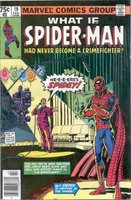 The death of each was a major psychological factor for their respective heroes, after all, raising their importance as dead men over who they'd likely be had they not died. Certainly, Uncle Ben's death was crucial to Peter Parker becoming a hero rather than simply becoming an egocentric prick, as it was his death that provided the necessary guilt to keep a bookish, bullied teen from going down the wanton path of power and priviledge once he found himself empowered in ways most could only dream of.
The death of each was a major psychological factor for their respective heroes, after all, raising their importance as dead men over who they'd likely be had they not died. Certainly, Uncle Ben's death was crucial to Peter Parker becoming a hero rather than simply becoming an egocentric prick, as it was his death that provided the necessary guilt to keep a bookish, bullied teen from going down the wanton path of power and priviledge once he found himself empowered in ways most could only dream of.Cap was already a hero many times over when he saw Bucky die in the same airborne explosion that dumped Cap into the icy Atlantic waters and started him on his cryogenic journey between the closing days of WWII and the iffy, always forward-shifting whenever it was that the Avengers found and revived him. It could be argued that the death of his young partner really did nothing more than to make him gloomy and reluctant to take on any new partners. Other than that it was just a failure haunting his nightmares and a helluva bad exit to his career as a major force in WWII and the 1940s in general.
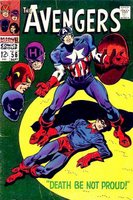
While always feeling the loss, Steve Rogers (Captain America) had long since accepted the death of his young, wartime partner in arms. Roy Thomas had devoted an issue of The Avengers to allowing Cap to use Dr. Doom's time machine to visit the past in a wraithlike form, watching that final, ill-fated mission. (The cover to Avengers #56 - seen here on the left - is one of those purely symbolic ones.) Due to a little interference Cap even got to play a small role in his own past by having his momentarily temporalized shield cut his 1944 self's bonds, not that it did him much good. In the end, no matter how despiriting the events, Cap was able to accept that Bucky was truly dead.
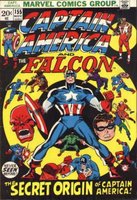
Chances are, while the Bucky theme was something Roy liked to play with -- including a short time later when he and Steve E. revived the Cap & Bucky of the 1950s over in Cap's own series -- I expect that Roy believed Bucky was dead and intended him to stay that way. You'd have to ask Roy.
Between his exit scene, the fact that the original Bucky didn't have any of that super soldier serum in his bloodstream, and that each new year would make any survivor of WWII that much older... it seemed more certain by the year that Bucky was gone for good.
In late 2004 Ed Brubaker received the assignment to write a new Captain America series. While I'd enjoyed his Eisner-nominated work on the 100 Bullets the one instance where I read him writing a costumed hero genre story (something with Batman?) had left me cold. He was a fine choice for a story about agents and criminals in plainclothes who were seeking revenge for vicious double-crosses, but he seemed to have little feel for anything else.
I don't know... maybe he's just more of a fan of the Marvel heroes and it was an antipathy to Batman?
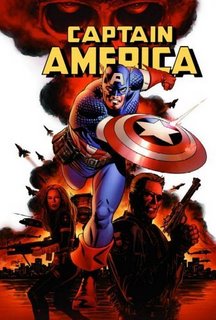 Either way, 2005 saw Brubaker writing a new Captain America series, the first seven issues of which were recently collected into a trade. (Seen here on the left.) I'd been hearing things both good and curious about the series for the past year, which nudged the hungry fan within into slow but building action. At various times in the past - albeit rather far back, though for quite a stretch of years - Cap had been one of my monthly staples, and there was a nostalgic drive to reconnect.
Either way, 2005 saw Brubaker writing a new Captain America series, the first seven issues of which were recently collected into a trade. (Seen here on the left.) I'd been hearing things both good and curious about the series for the past year, which nudged the hungry fan within into slow but building action. At various times in the past - albeit rather far back, though for quite a stretch of years - Cap had been one of my monthly staples, and there was a nostalgic drive to reconnect.So, I'd started to order and stockpile the monthlies a few months back, ordered the trade (here's the cover) and then had Mike T. pick up the linking issues between the end of the trade and where I'd started (#s 8-12) during a recent comics shop sale. (He has the membership there, so his 55% discount during that sale made this an inexpensive buy.) Heading into a few weekends pas (the 10th) the Westfield box with the trade in the mix arrived, and later that weekend I stretched out and plowed through the first 15 issues of the series.
It went much better than I'd feared. Perfect? Oh, no, certainly not, but it's mostly enjoyable.
As with pretty much everyone in the Marvel stable, the past 10 years in particular have been rough as Marvel's editors have too often been given the job with an emphasis on the wrong credentials. "Schmoozer" appears to be the top characteristic, with the approach being to hook up with "talent", make sure they're comfy and then let them do almost whatever they want. Any in-depth knowledge of the characters' histories apparently being seen as a detriment, though they're encouraged to dig enough to drop some references to the past so that they can deflect complaints from longtime fans as being a case of them being unreasonable. A great many readers walked away here or there, and part of the process of their coming to peace with things is being able to dismiss everything new that's come along. (Come to think of it, the folks from the pocket universe in DC's current Infinite Crisis series are a fairly good, semi-satirical representation of these "it was better in my day!" fans, and given the way things have been turning there perhaps some of that was intended as a lesson to grumpy, old fans.)
So far, through every line of this piece, I've been psychically hearing the moans of fellow older comics fans. The moans of the weary ones who caught the premise between the image and the header line and said something along the lines of "oh, what have they let the latest asshole of the month do?" or "oh, now they're fucking Bucky over?!" Fans who had dropped the title (whichever volume was running at the time) years ago and so have an emotional stake in declaring any subsequent series to be, well, a non-issue. They want their Cap safely tucked away and out of reach of later meddlers.
Believe me when I say that I understand. I've been there, and in some cases I'm still there.
Still, there's a hungry fan inside that demands I drop in on old favorites from time to time and see if someone who knows what he's doing happens to get the assignment.
Any time someone starts to revisit and question elements that have been in place for years there's no shortage of people ready to launch rafts laden with shit in their direction. In this case I'm finding myself more on the side of the writer than those fans, and would almost enjoy hearing Brubacher respond with "Oh, you're all so brilliant, but you didn't get this assignment. I did. Now it's part of Cap's history unless and until someone comes along with something to trump it." Almost. Being arrogant rarely helps.
The first 7-issue story arc (collected in the "Winter Soldier" trade) lays the groundwork, with the mystery coming up in the midst of terrorist plots involving the Red Skull and an off-shoot of AIM, the murder of the Skull and evidence of a flawed Cosmic Cube, followed by a devastating act of terrorism in Philadelphia. A clumsy framing of Jack Monroe - the Bucky of the 1950s who in more recent times became Nomad - for both the death of the Skull and the act of terrorism is thrown in, along with the final days of Jack himself.
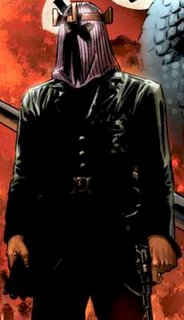 All throughout this Cap's finding himself remembering events from WWII in nightmarish ways. At first they're obvious nightmare versions, but then they shift towards suppressed or simply nearly forgotten memories. These include a protracted stay as captives in Heinrich Zemo's temporary base of operations in what would become the final wartime mission of the original Captain America and Bucky. Here Zemo's sadistic tendencies came to the fore and Cap was made to watch while Bucky was tortured. Given that we're dealing with a nazi scientist who was permanently disfigured during a raid by Captain America earlier in the war, I don't have a hard time accepting this, nor do I find it difficult to understand why Cap would have buried this memory.
All throughout this Cap's finding himself remembering events from WWII in nightmarish ways. At first they're obvious nightmare versions, but then they shift towards suppressed or simply nearly forgotten memories. These include a protracted stay as captives in Heinrich Zemo's temporary base of operations in what would become the final wartime mission of the original Captain America and Bucky. Here Zemo's sadistic tendencies came to the fore and Cap was made to watch while Bucky was tortured. Given that we're dealing with a nazi scientist who was permanently disfigured during a raid by Captain America earlier in the war, I don't have a hard time accepting this, nor do I find it difficult to understand why Cap would have buried this memory.Also remembered was a stretch of time spent with a Russian brigade on that front of the war, which involved both a distasteful (to Cap) Soviet colonel's methods and a run-in with the Red Skull in which a village is destroyed, nearly its entire population killed. A child, Alexander Lukin, survives and is taken under the wing of the Soviet officer, Colonel Vasily Karpov, beginning a path that will take him up through the ranks of power to the rank of General and a position of major power in the Cold War. It also sees the young Lukin nursing both a slanted view of events and a grudge against Captain America, both legacies of his adoptive "father."
While the identity of the Winter Soldier is revealed in this 7-issue arc, the resolution of the story - to the extent that such is possible or desirable in the short term - doesn't come until issue #14. It would have been in issue #13, but the alternate history briefly imposed by House of M called for issue #10 to be given over to the events of a timeline in which Cap's wish to have been able to save Bucky, finish out the war and return to the U.S.A. afterwards were granted; consequently that issue is essentially a What If? piece which has no bearing on, well, anything.
Now, whenever a Cosmic Cube is involved all bets are off. It's essentially a wishing device through which the posessor can make anything he desires come to pass. In this story the device is flawed, having been rebuilt from a smashed cube - one engineered by an offshoot of A.I.M., and initially contains only residual energy. If need be some retroactive reality shifts could be attributed to it, but it remains to be seen if that's even necessary.
The sequence of events as they currently stand concerning James Buchanan "Bucky" Barnes are as follows:
Bucky Barnes, a 16 year-old, orphaned military brat who's been "adopted" during wartime by an army base proves to be a natural at all aspects of combat. One of the officers privy to who Steve Rogers is - Captain America - informs Rogers that the government wants him to take Bucky under his wing and make him his sidekick.
(As an aside: Steve is said to be roughly 20 at this stage, so there's only a 4-year age gap between the two; still, that's a critical set of years and is all the more exaggerated by the super soldier serum having rushed Steve to the peak of human perfection.)
The partnering is seen as a propaganda move during wartime - that even the young are in this war - and also gives a nod to the many under-age soldiers whose age the military's essentially turned a blind eye to - accepting their claims of age, use of doctored birth certificates, etc. It's also seen as a single-person counterpoint to the Hitler Youth. Recognizing Bucky's skills, the military also sees Bucky as someone who would be willing to do some of the more distasteful necessities of war, sparing Cap from getting his hands red. This last element isn't leaned on at the time, but it's there. Steve is reluctant at first, but at least agrees to meet with Bucky and they hit it off.
Pausing a moment to evaluate, old-time Cap fans see the point of divergence with what we've hitherto known. In the original stories and the Golden, Silver and Bronze Age (comics geek talk - when referring to Marvel comics at least - of invoking the 1940's up into the 1980's or so... roughly) revisitations Bucky discovers Steve's secret identity and essentially blackmails him into letting him become his partner.
As an aside to fellow old Marvel fans who have problems with some of the approaches employed over at Marvel, but who are -also like me - enjoying Geoff Johns' approach to characters in The Teen Titans (among other places), the fans of the clone Superboy have a much bigger beef with changes made in their character than you do with what Brubaker's done with Bucky.
Johns has retroactively changed him from a human genetically altered to simulate Kryptonian DNA, to a half-human half-Kryptonian. Moreover, the source of the human DNA - be it wholly or in part - was retroactively changed to Lex Luthor when those who have followed the character since the whole "Reign of the Supermen" story in the early 90s knew that it was originally supposed to be a specific scientist at Cadmus. As someone who didn't care about the character before but does now that he's been in Johns' hands, I'm fine with the way it is now, too, but this is a case where we're part of the barbarian horde coming in telling the natives to grow up and get over it.
Getting back to Bucky --
Certainly, it's something that's up to each fan to decide, but I honestly think this is one of those cases where the changes made are both relatively minor and make much more sense. After all, having to explain how the camp mascot would even be allowedout in the field with the troops during wartime (the Bucky discovers Cap's secret identity scene takes place when Bucky rushes into Steve's tent, after all) unless there were people much higher up pulling strings and silencing intermediate levels of command... it's not a very defensible position.
Also, this version emphasizes a Bruce Waynish aspect to Bucky that's been under the surface, masked by a veil of childlike innocence that was fluffed up by the necessities of the Comics Code. I must give Brubaker his due in cutting through it. A kid who's lost his parents in the war and is being raised on a military base during a global war in which the propaganda machine was running full tilt, characterizing the enemies in both theaters of war as inhuman. Even a good-natured kid is going to be soaking up the competitive, martial, hyper-patriotic atmosphere and will find a need for revenge melding with his sense of patriotism. He's not angry nor openly hateful, because he's surrounded by allies who are all on the same team, battling the same enemy. They're simply the Good Guys.
Skipping ahead to the day of the last mission by Cap & Bucky, the now-General Karpov is commanding a small sub on an unspecified mission in the Atlantic. It's reasonable to accept that this was as much about gathering intelligence for the post-war period as it was about anything else. As comic book luck would have it they're within reasonable traveling distance when the (presumably coded?) message comes through that Cap & Bucky were apparently lost on a mission in the area, when the missile they were attempting to stop blew in mid-air.
We're shown - via Steve's recovered/nudged memories - that Bucky wasn't able to let go of the rocket because his left sleeve was caught. Steve's grip slipped and he went spinning off towards the icy drink. Bucky's sleeve likely tore a second or two before the explosion so that there was some distance between him and the blast, but his left arm was nonetheless mangled and essentially lost, and it was an unconscious, battered Bucky who hit the frigid water.
The Soviet sub got to the area against the advice of junior officers, and was really looking for Cap's body. Isolating the super soldier serum in his blood was a potential prize of such magnitude for the U.S.S.R. that it was deemed to be worth the risk of being discovered on a secret mission in the waters near Great Britain. Instead of Cap they found Bucky. The general had seen him in action earlier in the war and thought he, too, might have had the serum in his system, so they kept him on ice and sped for home.
Speeding the story up, they found no sign of the serum in his blood, but one of the more imaginative doctors decided to do a little experiment. Since between the trauma and the intense cold Bucky had gone into shock he suggested they try to revive him. They were successful, though Bucky had suffered considerable brain damage. The general made something of a pet project of the revived Bucky, finding something attractive in potentially being able to use him against the Americans.
Bucky had no memory of his own past, though his reflex memories - his various skill sets including being fluent in multiple languages - proved to be easily revived. He was re-educated with a new background and patriotic mission and in time fitted with the latest prosthetic arm -- presumably serviced and replaced over the decades. He was then used as a covert assassin whose skills were used to either make the death appear to be an accident or something easily pinned on some other power.
As for the decades, two decisions was made early on when there were some signs that he might be on the verge of remembering his past. One was to not send him back on missions in the U.S., as he went missing there for a couple weeks after a mission - finding himself drawn by vague memories. The other was to put him back into suspension between missions, and make use of a sleep-teaching methods to re-implant his false memories and priorities, presumably both as we was entering and emerging from his suspended state. So it is that he's aged so little in the years since his disappearance and presumed death.
There's more to the story, of course, as Nick Fury, Sharon Carter, Iron Man and The Falcon each lend a hand at some stage, and by issue #14 (all of which will be collected in a second trade) there's another level of resolution brought to the tale -- obviously leaving the future open. When Cap finally gets hold of the Cosmic Cube he wishes Bucky's memories restored and then crushes the cube -- having had enough experience to know that it's best used at the absolute minimum and then destroyed. Bucky, his memories and faculties restored, is aghast at the sudden, tragic summation of his life, and takes off.
As comics stories go, I give it fairly good marks and am continuing to follow the series.
Does it have flaws? Oh, certainly. Bucky's surviving the blast and fall and the Soviet sub being where it was are both... highly convenient -- but what in most comic stories isnt? Whether or not they stretch credulity beyond the breaking point in a universe where so many people have been empowered by radiation, etc. is really more a matter of attitude than reason. Some older fans have simply grown comfortable with Captain America - as a character or a series - being relegated to the past and so will be quick to disparage anything new that might force them to add to or revise their memories of the character and/or supporting cast. It's such a subjective matter I'm not about to tell them they're wrong. It's their choice.
The prosthetic -- okay, let's get it out of the way -- bionic arm Bucky's sporting is the least necessary, hokiest element in the mix in my humble opinion. In all the shots we see of it it's a metallic, ropey-cabled faux muscled affair not unlike the "organic steel" appearance of the X-Men's Colossus. That this was something technically functional as far back as the 1950's is another of those comic book tech elements that's always troubling. But if a professor in 1939 was able to create a completely synthetic lifeform that appeared to be human (Jim Hammond/the Human Torch) then a functional bionic arm in the 1950s produced with the resources of a government behind it is hardly a stretch. The troubling questions about any of that is the same one that plagues most comics hi-tech: Why isn't the rest of the world benefitting from these technical miracles?
That's not a question I'm going to attempt to tackle today, though some of it could be fended off much as the 1970s show The Six Million Dollar Man did: It would be too damned expensive.
Still, an advanced, metallic limb is likely to minimize the usefulness of an agent as a covert operative, all the moreso in more modern settings where metal detectors are everywhere. Of course, of course, being comics fans we rush to explain it away as newer, non-metallic materials being used during rebuilds... though why one would still make it look like chrome steel... oy.
Here's a shot from issue #11 in case you haven't seen the Winter Soldier himself. It's a cover shot, so it's drenched in "attitude", and it's important to note that at this stage we're looking at someone who's been carefully programmed to be a stone cold killer:
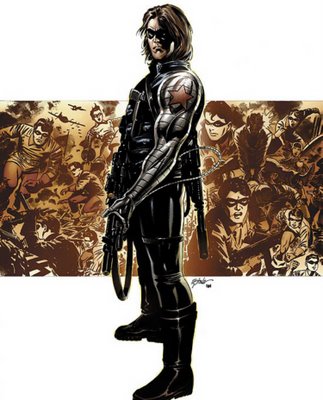
In subsequent appearance -- after Cap's restored Bucky's memories and personality -- Buck's cleaned himself up and gotten his hair cut.
I'm much more interested in seeing Bucky back than I am in maintaining a shrine to his ghost for Cap to wax mournful over from time to time. I'll be interested to see where the character goes from here as he attempts to make peace with himself and find his place in the world. In a very real way he's as much a man out of his own time as Steve Rogers is.
In the end, one of the two biggest points of conflict with older readers will involve levels and acceptability of violence. Obviously, some will rankle against a revised history in which Bucky, during many WWII military ops, would be inclined to be the one to slip behind enemy lines and slit the throat of sentries, that sort of thing. Were this to be characterized as standard operating procedure or, worse, something Cap really condoned it would be stretching things, but as it's presened I'm willing to accept much of it. Why? It was World flippin' War II!
Fans of the Silver Age characterization of Cap have to decide on a position. If they stick with the idea that established stories have to be given all possible weight, then they immediately lose the high ground because so much of their cherished Silver Age version of Cap (not to mention most of Roy Thomas' characterization of the Invaders) buries the pervasive attitude of the original, wartime adventures. The notion that Cap and his allies simply wouldn't take a life is something that came out of the long era of the Comics Code Authority lording it over mainstream comics until many of these elements became second nature. Consider, too, that the length of time (our time) between the stories of the 60s and 70s and the current run is at least as long and generally longer than that between the stories published in the 40s and those Silver Age tales.
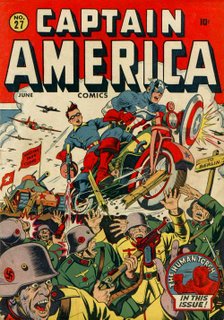 Now, at no time would I describe Cap as bloodthirsty and certainly there was no indication that killing was either his first choice nor anything he derived pleasure from, but given the scale and stakes of that conflict often the elements that separated the actions of the heroes to those of the villains were the above notes (not a first course of action and not something they derived pleasure from) and that the heroes wouldn't target civilians or militar who'd surrendered. Aside from that Cap and Buck would often blaze into battle with automatic rifles and grenades. As one looks at a survey of Captain America covers of the era Bucky's often doing one of two things: about to be tortured and/or killed, or on the offensive, sometimes using a deadly weapon such as a machine gun or even a flamethrower.
Now, at no time would I describe Cap as bloodthirsty and certainly there was no indication that killing was either his first choice nor anything he derived pleasure from, but given the scale and stakes of that conflict often the elements that separated the actions of the heroes to those of the villains were the above notes (not a first course of action and not something they derived pleasure from) and that the heroes wouldn't target civilians or militar who'd surrendered. Aside from that Cap and Buck would often blaze into battle with automatic rifles and grenades. As one looks at a survey of Captain America covers of the era Bucky's often doing one of two things: about to be tortured and/or killed, or on the offensive, sometimes using a deadly weapon such as a machine gun or even a flamethrower.In a modern context, too, some fans may object from the point where Sharon Carter, once and now again romantic interest for Cap, illustrates a recent turn towards more aggressive behavior as she recounts something from the precious week. Cap had gone after a small squad of terrorists who had killed a conductor on an elevated train, loaded the car with C-4 and radioactive waste, and was going to have it run to Coney Island at and explode as a dirty bomb. The terrorists were establishing a holding action on the train, defending it with automatic rifles and an armed helicopter back-up. With everything happening at a dangerous altitude and time rapidly running out Cap had to knock down who he could as quickly as he could, even though it meant those who fell would almost certainly die.
To any reasonable person this would be a no-brainer, perfectly rational, pragmatic solution. I'm hoping that most fans will do the same, but I have run into people who would insist that Cap would always find a way of disarming and disabling them without killing. The simple credo from that era is that heroes don't kill, and that that is the whole of the Law. I would hope that even the most hardcore of old school fans would accept that the situation described above didn't allow it. Besides, there's no indication that Cap wasn't figuring in likely landing zones for those who were knocked down where they'd have a greater chance of surviving. Cap moved to disarm and get out of the way; it wasn't as if he was throwing his shield to take anyone's head off.
I would hope that Sharon's using this situation as an example of Cap's actions "being a little extreme lately" would further make it clear that even this level of aggression was something that wasn't typical - something someone familiar with Cap would pick out.
As for Bucky's backstory and wartime activities, so far I'm seeing this as being a reasonable revisitation of a situation that either needed reinterpretation or had to be left as a shadowy footnote for fans to avoid elaborating on. Brubaker's made better sense of it and given Cap's story some interesting territory to explore.
Cap now, theoretically, has his old partner back even if they're not yet communicating. Someone who is out of his own time in a way that arguably Cap could only understand. He has huge moral issues to work out concerning his actions, no matter how much of a puppet he'd been while operating as the Winter Soldier. Beyond all that, even once he comes to peace with that, Cap'll have to come to grips with the reality of the man Bucky is versus the idealized, enshrined memories of his sidekick partner he'd fought alongside decades ago. Bucky, of course, has to figure out who he is, too.
So, while I have concerns that the Winter Soldier might in the short term become over-used (I caught wind of some Wolverine story where he'd been used in some assassination move years ago and he's finding himself the focus of vengeance actions by people he'd been used against over the years) I'm optimistic enough to be following it with interest.



Comments
So Bucky isn't dead any more, he's some guy called the Winter Soldier... at least, until someone else who doesn't like the story takes over the book and reveals it was all a hoax, a dream, or an Imaginary Story (or this Winter guy was actually a Space Phantom, attempting, as Space Phantoms are wont to do, to set Steve Rogers' mind to rest just prior to transplanting the Vision's brain into Cap's body).
In the meantime, given that THUNDERBOLTS and MTU are the only Marvel books I buy (I think) I'm not going to worry about it.
"Remember who you are."
It's Brubaker's answer to anyone who believes that Cap wasn't paying attention to the possible/probable consequences of using a Cosmic Cube to get anything done. Cap's seen how those gadgets get misused, after all...
I'm interested in Brubaker's decision to take a Faustian view of the Cube rather than simply let it stand as either a harsh spotlight on petty, fragmented dreams and withered characters (as with the times the Red Skull held it) or a more cosmic lesson that there's ultimately no joy in being God (Thanos' experience) where everything and everyone was subject to the Cube-holder's will.
I love this line you wrote. Heheheheh. I know it's a truism in comics but..shrewdly observed and expressed!